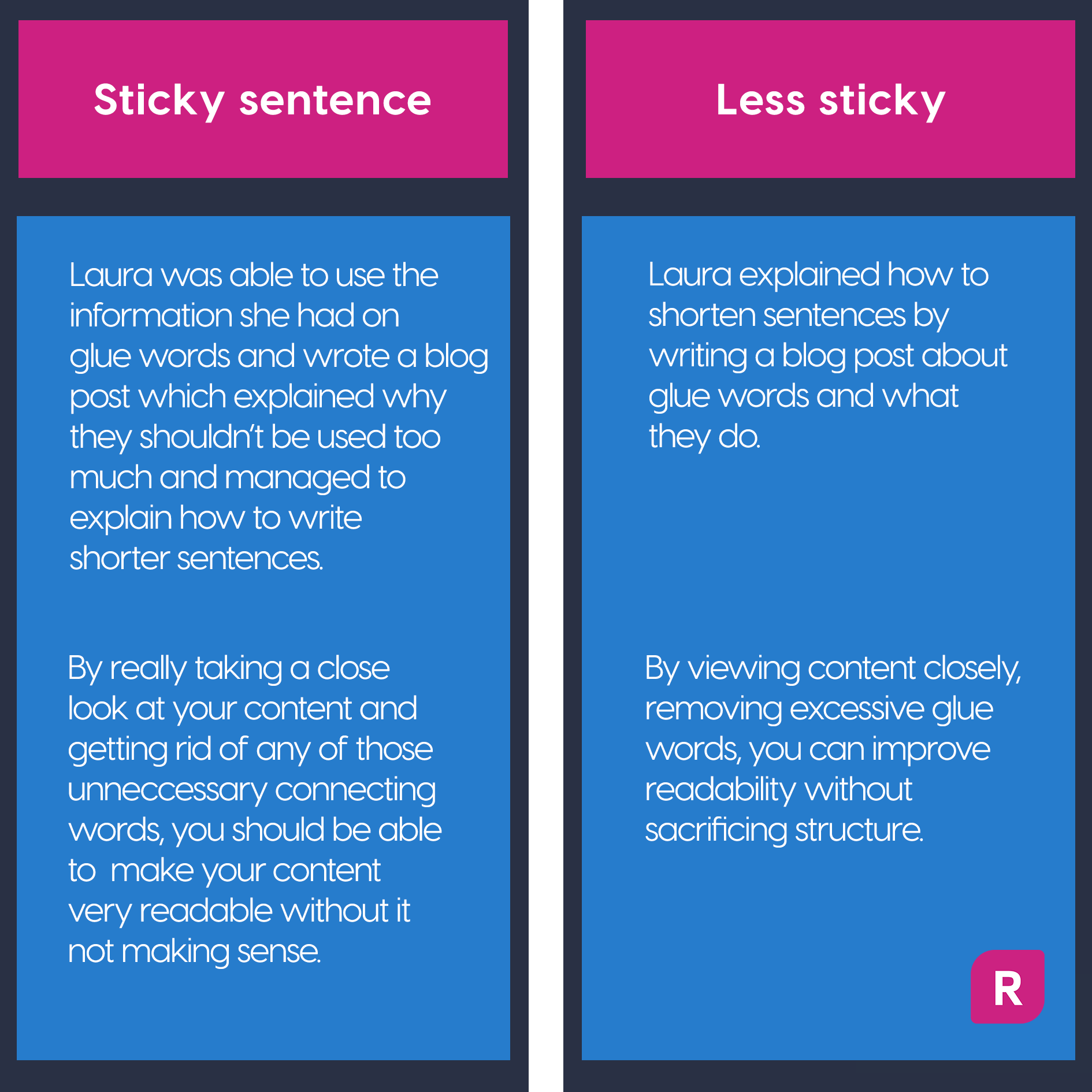Glue words can often dampen your efforts to shorten your sentences for readability. What are glue words and how can you remove them to sharpen your content?
What is a glue word?
Glue words are sometimes also referred to as ‘sticky words’. A glue word is a word that tends to be an essential part of a sentence. That is, many glue words are the connectives that hold it together, make it make sense. However, an overabundance can make the sentence slow and gloopy - in other words, sticky.
It is possible to make your sentence more concise, while still making sense and flowing well, by removing some of these glue words.
Richard Wydick, writer of Plain English For Lawyers, says the following about glue words:
"In every English sentence are two kinds of words: working words and glue words. The working words carry the meaning of the sentence. In the preceding sentence, the working words are these: working, words, carry, meaning, and sentence. The others are glue words: the, the, of, and the.
The glue words do perform a vital service. They hold the working words together to form a proper, grammatical sentence. Without them, the sentence would read like a telegram. But if the proportion of glue words is too high, that is a symptom of a badly constructed sentence.
A well-constructed sentence is like fine cabinetwork. The pieces are cut and shaped to fit together with scarcely any glue. When you find too many glue words in a sentence, take it apart and reshape the pieces to fit together tighter."
Wydick’s image of the fine cabinet is useful. If you can craft your sentence to hold together with minimal glue, you’re becoming a more efficient writer.
What are some examples of common glue words?
Some examples of glue words are:
- In
- Of
- To
- By
- There
- From
- Was
- For
- Some
- Much
Hopefully, you can see that whilst these words are useful, they can be used unnecessarily, creating a dithering tone.
Have you used the Readable readability analysis and had helpful feedback on very long sentences, but you don’t know where to start with shortening them? Well, looking for unnecessary glue words is a great start.
Many glue words are flagged by Readable as “lazy words”, a detector which also covers a range of words that might be harming your content.
What changes do I need to make to reduce glue words?
When trying to reduce glue words, it helps to view the words in your sentence as building blocks.
This way, you can pick out your nouns, verbs and adjectives - try not to overuse adverbs - and decide what’s essential for what you’re trying to say.
The words between the main points in your sentence are what holds them together, makes them possible as a structure rather than a string of nonsense. But, how many of these connectives and connecting words are essential?
Take the sticky sentences below.

Something as simple as changing ‘too much’ to ‘overused’ makes a big difference to how your sentence is read. ‘Used too much’, as well as adding too many glue words to your sentence, encourages it to dither and ramble on. It also sounds weak, as if you’re not sure of what you’re saying. ‘Overused’, however, is assertive.
This makes your sentence sound direct. Because your readers don’t have time to read a sentence that’s not going anywhere.
By reducing your glue words, you will improve your content by making it easy to read, in turn improving your readability score. You may look at a sentence marked ‘very long’ and think, but I can’t shorten that any more than I have. But, taking a look at how many sticky connectives you have can give you another perspective when you’re proofreading.
Why not test your content for lazy words and long sentences? Simply paste some content into our free readability test and experiment with how you can shave down your sentences in the editor. Your readers will thank you.


